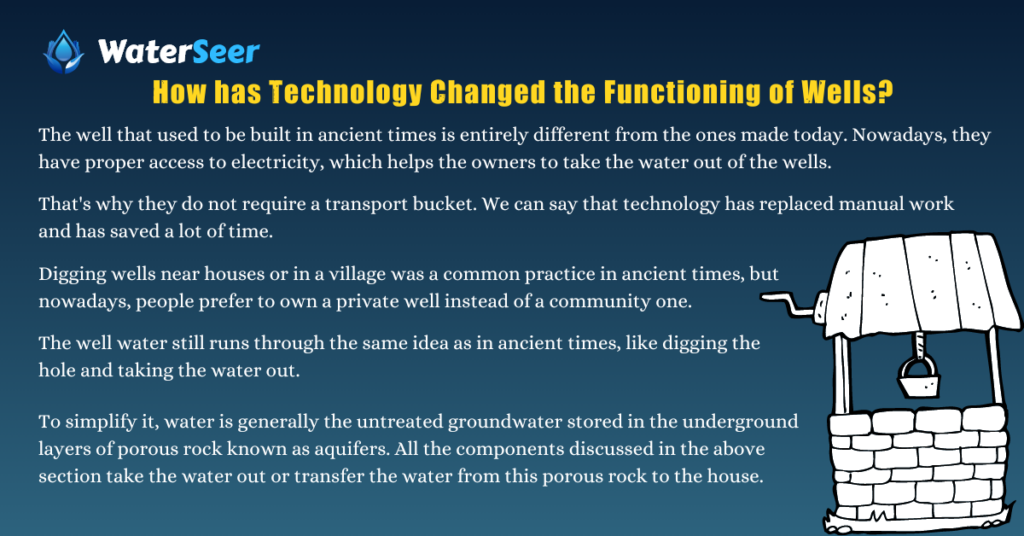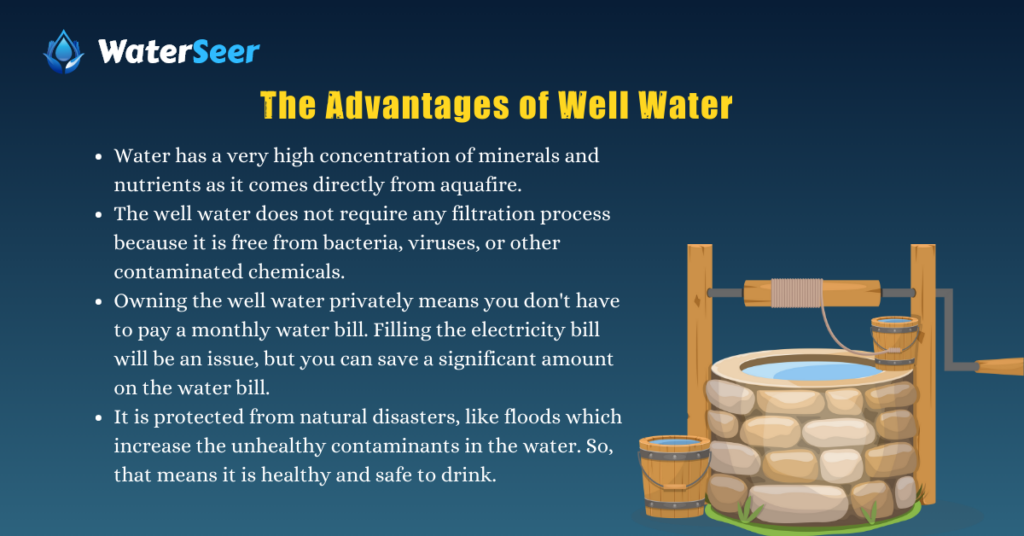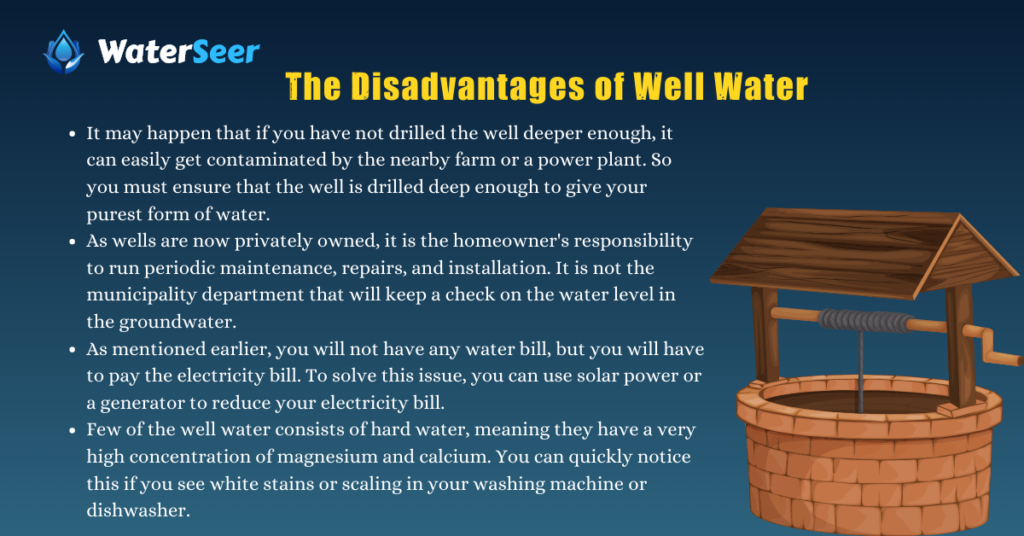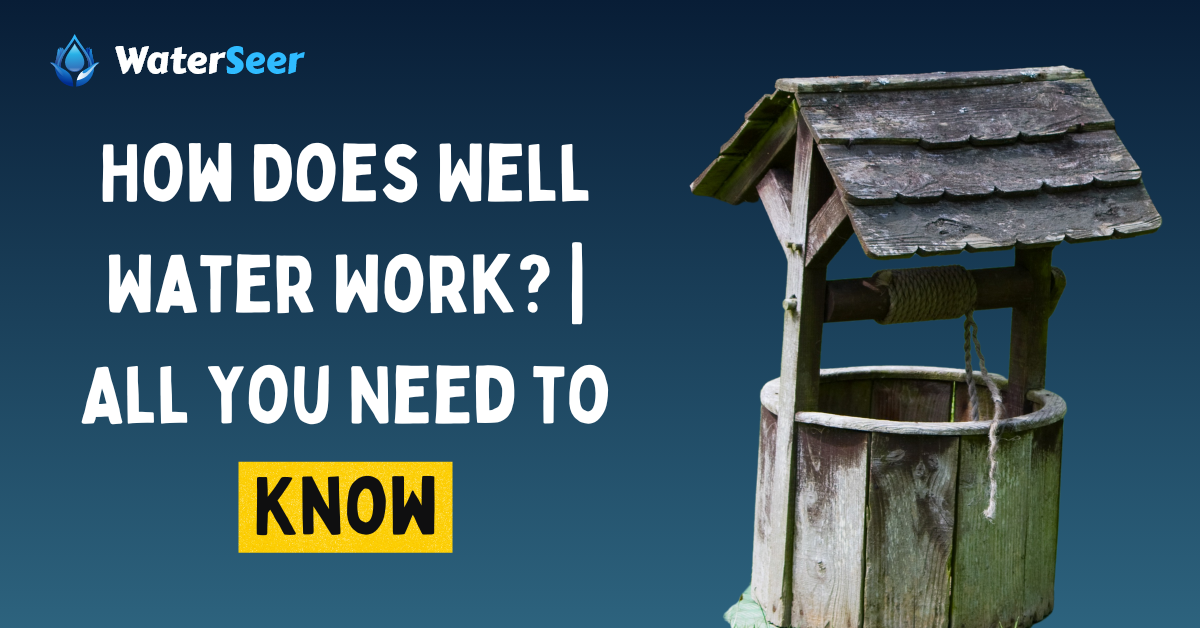Some say well water is safe and pure to drink as the soil on top of it acts as a water filter, and then some say the water might be contaminated.
There is no proper answer to if well water is safe for consumption. However, we can take measurable steps to ensure that the well water is free of contamination and healthy for drinking.
But the question is how well water works. Like, from does it come? And how?
This article will discuss the well water in detail and its function. We will also learn why we consider it one of the healthiest forms of water and what things you should keep in mind to protect it from contamination.
What is Well Water?
Well water is groundwater that comes from the ground when a deep hole is dug up or drilled with the help of excavators.
The most common kind of water is well water, which goes back eight thousand years.
Well are mostly inexpensive and low in technology as manual labor builds them. Although there are three kinds of well.
- Dug
- Driven
- Drilled
Constructing well is a complex task, and people are hired to accomplish this. You should contact professional water well contractors who know how to do the best work. The team generally looks after several factors. The most common factors are location, system size, and proper construction techniques.
There are four main components of a well, which are listed below:
- The casing is done to maintain open access, which will not allow the entrance of any harmful substance into the well.
- The aquifer is used to fill the spaces around the well. It has a responsibility to protect the entry of any toxic substance.
- The screen allows the formation of water, but it keeps the gravel and the sand out of the well.
- The gravel pack is installed outside the screen, which prevents clogging and stabilizing the screen.
There are different materials for every component depending on the size as well as the site of construction. So we’ll always recommend contacting a professional well constructor to build a wall around your house or area.
Also Read:- SpringWell Whole House Well Water Filter System Review
How Has Technology Changed the Functioning of Wells?

The well that used to be built in ancient times is entirely different from the ones made today. Nowadays, they have proper access to electricity, which helps the owners to take the water out of the wells.
That’s why they do not require a transport bucket. We can say that technology has replaced manual work and has saved a lot of time.
Digging wells near houses or in a village was a common practice in ancient times, but nowadays, people prefer to own a private well instead of a community one.
The well water still runs through the same idea as in ancient times, like digging the hole and taking the water out.
To simplify it, water is generally the untreated groundwater stored in the underground layers of porous rock known as aquifers. All the components discussed in the above section take the water out or transfer the water from this porous rock to the house.
So whenever a well is drilled, it is drilled down to 1000 feet to access the water source. Now another question is how can the water be easily accessed in the houses or how can we transfer the water to every faucet of homes.
In ancient times, people used to transport buckets, and a pull mechanism like a pulley was used to take the water out of the groundwater. Then the people transferred that water to a bucket and refilled it to transport it.
It used to be another level of hard work and a time wastage procedure, but today, people have become smart and use electricity to pump water from the well.
The constructors will pipe between the pressure tank and the well’s casing. The pressure tank is in the basement of every house, which pulls the water out from the well and distributes it to all the faucets in your home.
Also Read:- Well Water Vs City Water: Which One is Better?
An Overview of the Process of How Does a Well Work
The screen is the lowest part of the ground well to block debris and sediment. It only allows the water to pass to the screen and enters the casing.
Now in the casing, the pipe connects your house’s plumbing system to the underground water. This is most common in the modern case, which pushes the water out and distributes the water into different facets of the houses.
This pipe is connected to the pressure tank, facilitating a proper supply to all the faucets. The tip of the casing is the last part that helps to sanitize the water.
It acts as a cap that does not allow the wildlife of the pets or other contaminants to find their way into the well.
What Are the Advantages and Disadvantages?
Water is an essential part of a living organism’s life. Well water provides one of the purest forms of water. People prefer it because it directly comes from rocks and is untouched or free from contaminants. But every coin has two sides. So does the groundwater! Before entirely relying on a particular water source, it is essential to know every detail. In this section, we will discuss some advantages and disadvantages.
The Advantages of Well Water

- Water has a very high concentration of minerals and nutrients as it comes directly from aquafire.
- The well water does not require any filtration process because it is free from bacteria, viruses, or other contaminated chemicals.
- Owning the well water privately means you don’t have to pay a monthly water bill. Filling the electricity bill will be an issue, but you can save a significant amount on the water bill.
- It is protected from natural disasters, like floods which increase the unhealthy contaminants in the water. So, that means it is healthy and safe to drink.
The Disadvantages of Well Water

Sometimes we believe that well water is entirely healthy, but it is not so. A few of the disadvantages are listed down below:
- It may happen that if you have not drilled the well deeper enough, it can easily get contaminated by the nearby farm or a power plant. So you must ensure that the well is drilled deep enough to give your purest form of water.
- As wells are now privately owned, it is the homeowner’s responsibility to run periodic maintenance, repairs, and installation. It is not the municipality department that will keep a check on the water level in the groundwater.
- As mentioned earlier, you will not have any water bill, but you will have to pay the electricity bill. To solve this issue, you can use solar power or a generator to reduce your electricity bill.
- Few of the well water consists of hard water, meaning they have a very high concentration of magnesium and calcium. You can quickly notice this if you see white stains or scaling in your washing machine or dishwasher.
Is the Well Water Pure?
Most of us were confused about whether the well water or groundwater was pure or contained harmful particles.
Now, as we discussed earlier that well water is considered the purest form of water, but it can easily get contaminated by nearby farmers or power plants.
Furthermore, if you have not used a proper securing method to cover the well, wildlife can enter the well, thus contaminating the other groundwater.
To protect the groundwater, you can follow the below-listed options:
- Ensure you know everything about the well-testing. Good constructors or professionals can give you all the information about this.
- Always call certified service technicians or licensed professionals to maintain the well.
- You should use caution around the well.
- Always install a good cap; this will help keep hazardous or contaminated materials away.
Frequently Asked Questions
Can well be dug in any location?
No, the well cannot be dug to any location of your choice. You should always contact a well-constructor professional for help so that they can figure out what location will be the most suitable one.
Can I get sick and diseases from well water?
Yes. You can get sick, and diseases from well water if it contains harmful chemicals and bacteria. Waterborne diseases can affect you if the wells are not adequately drilled deep enough, or else the nearby industrial plants can contaminate by the chemicals.
What to do if there is a stain or smell from the well water?
Stains or smells can mean that the water has a high presence of iron and sulfur. High sulfur will smell like rotten eggs, and if there is high iron, the water taste will be metallic. This issue can be easily fixed, but you must contact a professional, well-contractor.
Is there any chance that your well water will run out?
Yes, there is a high possibility that the well water will run out, especially if you live in a drought area. This happens when the underground water level drops, and there is insufficient water supply to every home tap.
Conclusion
Until today, the well water runs with the original idea and still uses the same techniques used in ancient times. A well is created by digging a hole deep into the ground and extracting the water from it.
But the idea of taking the water out from the well has been highly changed. The electricity is used to pull the water out and create pressure so that the water can be supplied to every house faucet.
In this article, we have discussed the well water in detail and listed all the essential information for you. We hope that all questions about how to work well have been answered and helped you gain and implement that knowledge in real life.

